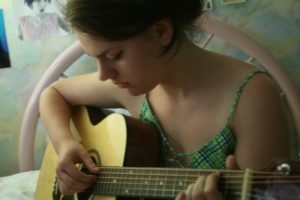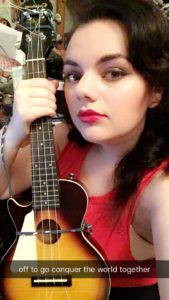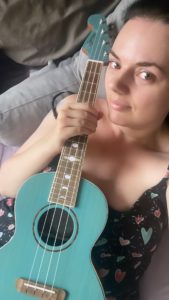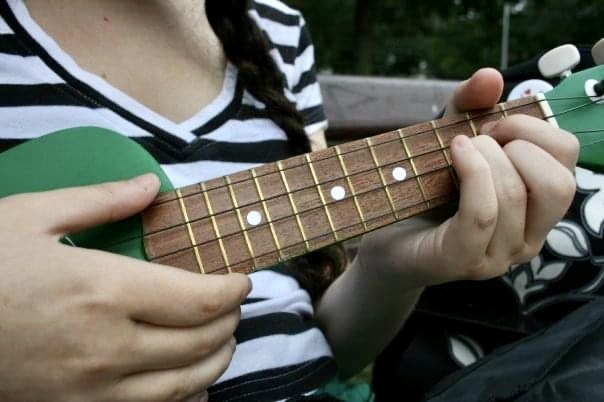
Ukulele, small and fierceful
Ukulele, brave and peaceful
You can play the ukulele too –
It is painfully simple
-Amanda Palmer, “Ukulele Anthem“
I’ve been writing songs since before I knew how to play any instruments; it’s baked into me how yeast is baked into bread. But instruments are a big part of how you bring music into the world, and convey to listeners the way you’re hearing your songs inside your head, and so I always wanted to learn to play an instrument, long before I ever did.
A year or more into piano lessons (which I enjoyed, though I begrudged having to practice my Bach and Chopin), I started listening obsessively to indie folk artists on a website called PureVolume (it was sort of like the MySpace of the music industry at the time) and, in particular, found myself drawn to songs written on acoustic guitars. I had an old violin, inherited from a relative and missing a string, and I would sit in front of the family computer plucking out simple chords on this creaky old instrument and sing over them into a USB microphone. Once, my dad walked by while I was doing this, and he remarked aloud, “We gotta get this girl a guitar.”

He did, and it’s still one of the most meaningful acts of love I can recall in my life. He took me to Long & McQuade, arguably the best music shop in Toronto, and I told the salesman I wanted an acoustic guitar. (Electric guitars weren’t really on my radar; the artists I cared about then were all writing on acoustics.) The salesman asked me if I wanted a steel-stringed guitar or a nylon-stringed one, and I didn’t know, so he grabbed one of each. “Nylon-stringed guitars are usually used for classical music,” he explained, playing a bit of fingerpicked flamenco on the one he’d chosen, “whereas steel-stringed guitars are used in folk music.” He played a few bars of music that sounded like folk-rock to me – like the music I’d been listening to on PureVolume – and I said, “That one, please.” My fate was sealed.
I loved my guitar, and took lessons for a few years from a chill-as-hell Irish hipster named Eoghan (pronounced like “Owen”) who was getting a degree in jazz guitar. One December, my mom sent along a box of cookies for me to give him as a Christmas gift, and he was so surprised and flustered by this that he gave me a huge book of jazz standards he happened to have in his guitar case that day. I treasured that book, and still have it.
No matter how many guitar lessons I took, though, it just never felt as natural to me as singing or playing the piano. My fingers weren’t strong enough to play barre chords, or nimble enough to swap quickly between different chords. True, I could have (and should have) practiced more than I did, but it felt like I was hitting an insurmountable wall, limited by my level of physical ability.
My guitar teacher worked out of a music school on top of a music store, and so I would walk through their rows of instruments every time I went to a lesson. And sometime around age 16, I began to notice the ukuleles hanging adorably in a back corner. One fateful day in 2008, I took a couple friends with me to the shop and picked out a bright green Beaver Creek ukulele, paid approximately $40 for it, and walked out holding my musical future in my hands.
It was just so clear to me, so quickly, that I was meant to play the ukulele. I fell in love with it the way I fall in love with human beings: quickly, obsessively, and all-consumingly.

See what happens when you muzzle a person’s creativity
And do not let them sing and scream
And nowadays, it’s worse, ’cause kids have automatic handguns
It takes about an hour to teach someone to play the ukulele
About the same to teach someone to build a standard pipe bomb
You do the math!
-Amanda Palmer, “Ukulele Anthem“
If you’re not familiar, the ukulele differs from the guitar in a few key ways. It’s smaller, and tuned higher; it’s cheaper, and has a thinner but more playful sound. And, crucially, it has only four strings instead of six, so chord shapes are simpler, requiring less nimbleness and coordination of the player’s fingers. Its strings tend to be made of nylon or similar materials, so it doesn’t require as much strength as pressing down on steel guitar strings, which can bite into your fingertips like knives if you haven’t formed callouses there yet.
I wasn’t diagnosed with fibromyalgia yet at that time, and who knows when I actually developed that illness – but the struggles which led me to prefer ukulele over guitar have only deepened over the years, in large part due to my fibro. My hands are weaker than I’d prefer, and often sore. I’m clumsy and prone to dropping things, stumbling, hitting wrong notes on the fretboard. I’m frequently frustrated by an inability to translate the songs I hear in my head into an audible, tangible result that I can share with others. The ukulele, therefore, is perfect for me.
With the barrier of insufficient hand strength removed from the equation, I’ve gotten much better at ukulele than I ever got at guitar, even though I took guitar lessons for years and am mostly self-taught on the ukulele. I can play complicated chord changes from jazz or musical theatre, and never (okay, almost never) get so frustrated that I want to throw my instrument across the room. I can strum chords or finger-pick, write songs or learn other people’s songs. It feels easy and natural to me in a way that guitar never did.
 There’s a term I love, “access intimacy,” which I learned from some kink workshop at a conference long ago. (I can’t recall who introduced me to this concept, or I would credit them.) It refers to the intimacy you can have with people who recognize and meet your access needs – whether those needs are related to physical disabilities, such as requiring ramps and access to handicapped bathrooms, or mental-emotional issues, such as needing to avoid certain PTSD triggers or needing a slow approach to task-switching due to ADHD.
There’s a term I love, “access intimacy,” which I learned from some kink workshop at a conference long ago. (I can’t recall who introduced me to this concept, or I would credit them.) It refers to the intimacy you can have with people who recognize and meet your access needs – whether those needs are related to physical disabilities, such as requiring ramps and access to handicapped bathrooms, or mental-emotional issues, such as needing to avoid certain PTSD triggers or needing a slow approach to task-switching due to ADHD.
I genuinely feel that I have “access intimacy” with the ukulele. It meets me where I’m at. It enables me to make music, write music, and feel like I’m a part of the music-making community, even though virtuosic guitar-playing is beyond my grasp.
The cheapness and accessibility of ukuleles is also highly democratizing. As singer-songwriter Amanda Palmer points out in her “Ukulele Anthem,” beginner ukuleles are usually pretty affordable (you can find ’em for $20-50, although I’d recommend spending at least $40 if you want a decent-sounding uke), and the chords are simple enough that you can pick up many of them in just an hour or two of practicing, especially if you have some music knowledge under your belt already. I love knowing that even if I suddenly needed to spend a lot of time away from home – as Amanda Palmer did when she got stuck in New Zealand toward the beginning of the pandemic – I could walk to a local music shop and be reunited with my favorite instrument for less money than a meal at a mid-tier restaurant. It makes me feel safe and secure, knowing I can take my music with me anywhere I go. One of the deepest and truest ways I know my spouse really loves me is that they keep a ukulele in the corner of their living room, even though they don’t play any instruments, simply because they know I’m calmer and happier when there’s a ukulele nearby that I can pick up whenever the whim strikes.
Nowadays, even as I’m mired in seasonal depression and fibro pain and general 21st-century millennial malaise, I keep a soprano ukulele on my bed so it’s always there when I feel like reaching for it. Not next to my bed, not near my bed, but on my bed. It’s small enough that I can do that. And many days, having it there is the difference between feeling sad and listless, and playing songs until I find my smile again.
I’ve taught ukulele lessons, I’ve bought ukuleles for friends, I’ve evangelized about ukuleles to all who would listen – and the reason for all this is simple. The ukulele has changed my life, made it brighter and bolder and easier and more fun. It has made music feel delightful instead of soul-sucking and painful. Every time I hold this little instrument in my arms, I feel grateful to be able to pluck its four strings.
So play your favorite Beatles’ song
And make the subway fall in love
They’re only $19.95; that isn’t lots of money
Play until the sun comes up
And play until your fingers suffer
Play LCD Soundsystem songs on your ukulele
Quit the bitching on your blog
And stop pretending art is hard
Just limit yourself to three chords
And do not practice daily
You’ll minimize some stranger’s sadness
With a piece of wood and plastic
Holy fuck, it’s so fantastic, playing ukulele!
-Amanda Palmer, “Ukulele Anthem“
